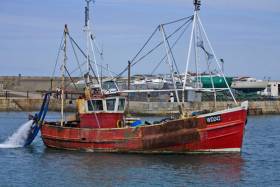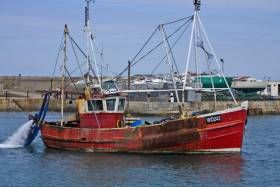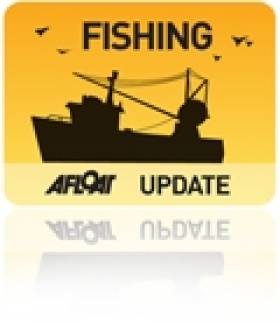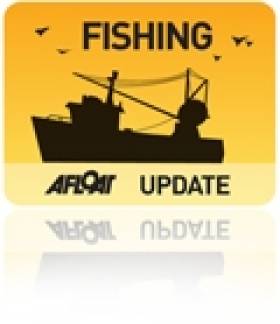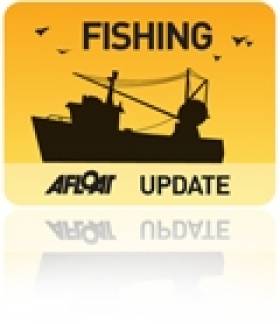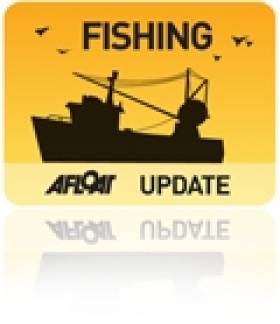Displaying items by tag: EU Fisheries Council
McConalogue Trumpets Progress on Quotas at EU Fisheries Council — But Negotiations With Norway Suspended
Marine Minister Charlie McConalogue has welcomed progress made on key fish quotas for Ireland at the EU Fisheries Council of Ministers which began on Sunday morning (11 December).
The council has been agreeing provisional fish quotas to enable EU fishers to operate from the first of January.
In parallel, the Department of Agriculture, Food and the Marine says “intensive” work has continued to conclude a deal with the UK which would see full-year quotas established for 2023 on the majority of stocks of interest for Irish fishermen, which are jointly managed with the UK.
Speaking on Tuesday (13 December), Minister McConalogue said: “The EU negotiations with the UK on setting quotas for 2023 are at an advanced stage and I made use of the opportunities at the Fisheries Council to work with fellow ministers. I also continued my discussions with Commissioner Sinkevičiusto ensure that Ireland’s priorities are protected.
“My objective has been to set quotas based on scientific advice and rebuild depleted and overfished stocks. In general, I want our fishers to have access to the maximum level of quota that can be sustainably fished, whilst taking account of the complex nature of mixed fisheries.
“As the negotiations are almost complete, I am satisfied that the agreement will deliver on this objective. We have positive advice on a number of our critical commercial stocks including spurdog, nephrops, Celtic Sea monkfish, hake and megrim and northwest haddock and whiting.
“I am satisfied, following the work done over recent days that we will deliver quotas that follow the increases advised by the science. I am also supporting cuts where these are needed to reduce fishing pressure on stocks and restricted catch limits for depleted stocks.”
The Fisheries Council adopted provisional quotas for the first three months of 2023 as the EU/UK agreement is not finalised. These quotas will support fishing at the beginning of the year, the minister said: “I do not expect we will need these provisional quotas but they are an insurance policy to provide certainty for our fishers.”
Meanwhile, negotiations with Norway were suspended amid an atmosphere “negatively impacted at European level by Norway’s recent fisheries discussions with Russia”, Minister McConalogue said.
“My main issue of concern remains that [European Union] member states who benefit from an agreement with Norway pay their fair share in quota transfers.
“I am working to limit the transfer of blue whiting and keep it at no more than 4% of the blue whiting global total allowable catch (TAC). I am also working closely with Commissioner Sinkevičius to restrict access for the Norwegian fleet to the Irish zone and in particular the area within 50 miles of the Irish coast.
“I expect that negotiations will reopen soon and I am satisfied that Ireland’s key concerns are clearly understood and will be protected.”
At the EU Fisheries Council in Luxembourg today, Monday 13 June, Minister for Agriculture, Food and the Marine, Charlie McConalogue outlined Ireland’s priorities during discussions on preparation for negotiations on setting quotas for 2023.
The minister praised the efforts of all fisheries stakeholders for their ongoing contribution to delivering on the CFP’s core ambition of sustainable fisheries management.
“I noted that considerable progress has been made over the recent years in setting sustainable quotas for our important fisheries,” he said.
“I supported the commitment to delivering quotas for 2023 that build on the progress we have made. I emphasised in particular the importance of the EU addressing effectively the current unsustainable behaviour of Norway, Iceland and the Faroe Islands setting unilateral unsustainable quotas for mackerel and blue whiting.”
The minister raised again the disproportionate impacts of the EU/UK Trade and Co-operation Agreement on Ireland’s quotas.
“I made clear at Council that we need a full CFP review that takes stock of the disproportionate impacts imposed on the Irish fishing industry by Brexit and the outcome of the EU-UK Trade and Co-operation Agreement (TCA).
“If we are to continue to build on our hard-won progress, we must acknowledge and take stock of the many ways that our fisheries landscape has been totally transformed by Brexit and the TCA. This will allow us to find solutions in a spirit of solidarity within the Union to adapt and once again thrive in, our totally new post Brexit environment.”
The minister concluded by saying: “I have assured Commissioner Sinkevicius that I will continue to work closely and constructively with him and with fellow Member States on these challenges to build a sustainable future for our fishing industry.”
Marine Minister Challenged To Balance Sustainability With Industry Concerns At EU Fisheries Council
Marine Minister Michael Creed is headed to Brussels for the EU Fisheries Council starting tomorrow (Monday 16 December), which faces the twin challenges of improving the sustainability of fish stocks while maintaining the viability of the fishing industry.
Speaking ahead of the annual EU Fisheries negotiations, the minister said: “The CFP sets out the objective of settings Total Allowable Catches (TACs) and quotas to deliver sustainable fisheries. This means setting TACs and quotas at levels that ensure long term sustainability, known as Maximum Sustainable Yield (MSY).
“At EU level we are committed to apply this level of sustainable management for all stocks by 2020. We are now committed to taking the necessary decisions, including applying reductions where necessary, to rebuild fish stocks.
“Making prudent decisions now will be of benefit to these stocks – and the fishing industry which depends upon them.”
The minister and his department have faced criticism for perceive inaction on overfishing in Ireland’s waters, a situation predicted to result in threatened fish stocks and slashed quotas for the Irish fishing fleet.
Last week the environmentalist movement Extinction Rebellion teamed with the Irish Wildlife Trust for a demonstration at Leinster House to bring attention to the issue.
Minister Creed said: “While there are many challenges ahead, we must also recognise that significant progress has already been made. For the 74 stocks of interest to Ireland, 35 are now fished at MSY. This figure has been improving, year on year, since 2013.”
The European Commission’s proposal includes increases to a number of important stocks including mackerel (41% increase), haddock (30% increase), monkfish (7% increase) and megrim (3% increase) in the Celtic Sea.
Referring to proposed cuts to Celtic Sea cod and whiting, the minister said: “We fully share the concerns about the current state of these stocks. We are supportive of additional measures to improve selectivity and reduce the quantities of cod and whiting caught in mixed fisheries in order to rebuild these stocks.
“At these negotiations, my goal will be to work constructively with the commission and other member states to find comprehensive solutions which will protect vulnerable stocks while allowing sustainable fishing of other stocks to continue.”
He added: “This year has seen the full implementation of the landing obligation or ‘discards ban’, bringing an end to the dumping of perfectly good fish at sea. Implementing the landing obligation is not without its difficulties, but we will continue to work with industry and our experts in BIM and the Marine Institute to make it work.”
As part of the open consultation process on the European Commission’s proposal, the minister met with fishing industry representatives and environmental NGOs on the 25 November. He will meet all stakeholders again this evening (Sunday 15 December) in Brussels ahead of the council.
Minister Creed said: “I would like to take this opportunity to thank all stakeholders for their efforts to ensure the long-term sustainability of fishing in Ireland and throughout the EU.
“In particular, I would like to recognise the contribution of the men and women of the fishing industry, who are on the front line of these changes. Without their hard work and dedication, none of this progress would have been possible.”
#Fishing - Following two days of intensive negotiations at the EU Fisheries Council which ended at 7.30am this morning (Wednesday 13 December), Marine Minster Michael Creed secured a total package of fish quotas worth €266 million for Irish fishermen for 2018.
For 2018, a total of 40,168 tonnes of whitefish quotas were agreed. Speaking from Brussels, Minister Creed explained: “The total €152 million value of the whitefish quotas secured for the Irish fishing fleet amounts to an 8% increase in value from last year and a 3% increase in volume. I am satisfied that this is a good and balanced result overall.”
Ireland’s quota for prawns amounts to 10,729 tonnes with a value of €83m. “This year we secured a 15% increase in prawns, worth over €10.6m directly to the Irish fleet, which is the biggest single increase in over a decade and shows the very healthy state of this stock, overall,” said the minister.
The rebuilding of many stocks in Irish waters is also demonstrated by a 34% increase in the Irish whitefish quota off the North West Coast and a 64% increase in the Irish Sea compared to five years ago – both areas where stocks were depleted.
Minister Creed spoke of the positive outcome for the Irish Sea, where he said “cod and haddock stocks have recovered after many years of intensive industry-led conservation measures.
“The cod stock in particular was in a near state of collapse since 2000. The work done to rebuild this stock and the haddock stock has paid off this year with significant increases for both quotas for our East Coast fleets.”
The Celtic Sea herring fishery is managed under a plan prepared by the Irish fishing sector which requires a 30% cut in 2018.
“In line with the recommendation of the Irish fishing sector, we have followed the management plan for Celtic Sea herring,” said Minister Creed. “This plan is precautionary and the cut is required to rebuild the stock after a period of decline since 2015.”
One difficult proposal concerned Ireland’s recreational sea bass fishery where the European Commission had sought a complete ban on angling for six months of the year.
Minister Creed successfully argued for a year-round ‘catch and release’ fishery that would not endanger the stock while protecting a vital tourism resource.
Overall, the minister spoke of his satisfaction that in this year’s EU Fisheries Council, another important step has been to deliver stocks at maximum sustainable levels.
“The progress we have made this year will continue the journey we are all on to rebuild our fish stocks which underpin the future of our industry and our coastal communities,” he said.
“There were a number of difficult issues facing us this year but I believe that the final package is a balanced and sustainable one. I would also like to express my appreciation for the cooperation and assistance I received from the fishing industry and NGO representatives in Brussels during the negotiations and in the months preceding them.”
The main outcomes negotiated at the 2017 EU Fisheries Council include:
- In the North West, a 20% increase in monkfish, a 21% increase for horse mackerel and a 26% increase in the haddock for the ports of Greencastle and Killybegs.
- A 15% increase in the prawn quota, worth €10.6m, which benefits the ports of Clogherhead, Howth, Union Hall, Castletownbere, Dingle and Rossaveal.
- In the Irish Sea, the recovery in the cod stock has seen a trebling of the quota; the Irish Sea haddock quota has also increased by 55%. These stocks are mainly important for the ports of Clogherhead, Howth and Kilmore Quay.
- A 13% increase for albacore tuna which is important for the southern ports of Castletownbere and Dingle.
- For the mixed whitefish fisheries off the South and West Coasts, a 2% increase in cod, a rollover in monkfish, an 11% reduction in haddock, and a 19% reduction in whiting all in accordance with scientific advice.
Coveney Calls For Flexibility In EU Fish Quotas
#Fishing - Marine Minister Simon Coveney called for "increased flexibility" in fish quotas at the latest meeting of the EU Agriculture and Fisheries Council in Luxembourg yesterday (Thursday 22 October).
“I have called on the [European] Commission for increased flexibility in the management of certain fish quotas, which will allow member states carryover quotas to the following year," he said at the meeting of the EU's agriculture and fisheries ministers.
"I have sought flexibility specifically for mackerel, Celtic Sea herring and horse mackerel. This flexibility will to help alleviate pressure in the sector caused by the Russian ban on imports“.
Minister Coveney also used the opportunity to reinforce Ireland’s commitment to 'climate-smart' agriculture.
"It is important to encourage a coherent approach to agriculture and land use and to incorporate the critical role that afforestation and forest management plays in carbon sequestration," he said.
Ministers also had an exchange of views on the EU/Norway fisheries negotiations and discussions on the Sustainable Use of Pesticides Directive.
Quota Cuts 'Threaten Jobs' In Irish Fishing Industry
#Fishing - Marine Minister Simon Coveney has defended a deal reached in Brussels that will see a reduction in Ireland's quotas for prawn and haddock, which some argue will cost the economy many millions of euros.
As The Irish Times reports, the Federation of Irish Fishermen (FIF) says as many as 350 jobs could be lost following the EU Fisheries Council's agreement to cut the Irish prawn quota by 9% and the haddock quota by a third - a move FIF's chair Francis O'Donnell described as "a charter for discards".
O'Donnell says that the cuts to two of Ireland's most valuable catches, plus similar reductions for cod and whiting, will mean an 8% overall income loss for the Irish fishing fleet - despite significant and welcome quota increases for hake (49%), megrim in the north-west (20%) and monkfish in the south-west (15%).
Defending the deal, Minister Coveney says people "need to look at the whole package", emphasising that the "overall value of fishing opportunities" is the same as last year, at a value of €250,000, which in his view "can keep the fishing fleet intact, and commercially viable".
The Irish Times has much more on the story HERE.
Marine Minister Warns Of 'Exceptionally Tough' EU Fisheries Negotiations
#Fishing - Marine Minister Simon Coveney is attending the EU Fisheries Council in Brussels from today (16) till Wednesday 18 December, where quotas for the Irish fishing fleet for 2014 will be determined.
According to the minister's department, the proposals put forward from the European Commission impact the Irish white fish sector with severe cuts in many stocks of vital importance to Ireland.
This year’s negotiations will also be heavily impacted by the lack of progress on the annual talks on fisheries opportunities for 2014 between the EU and Norway and between the EU, Norway, the Faroe Islands and Iceland.
This lack of progress means that the council will only be able to discuss provisional quotas for mackerel, blue whiting and Atlanto-Scandic herring for 2014.
Minister Coveney said: “I have considered the scientific advice available on fish stocks carefully. In some cases the advice is firm and it is clear that quota reductions will be required. However, I am not convinced that the proposed level of cuts is justified in certain cases.
"The total financial impact of the proposed cuts would, according to Bord Iascaigh Mhara (BIM), amount to over €70 million. I accept that some reductions are inevitable to protect the health of stocks, but I also believe that the commission’s interpretation of the scientific advice in some cases is excessively precautionary and will only result in increased discarding of fish at sea.
"I do not wish to see the council taking decisions which could result in an increase in quota driven discards. In such cases, I will be making a strong case for a more reasonable approach to the available advice, especially in mixed fisheries.”
The minister went on to highlight some of the proposals where he is especially concerned about the potential negative effect on incomes in Ireland's coastal communities.
“The commission is proposing a 24% cut in the hugely important prawn fishery. I do not consider that this proposal is justified and I am working with my UK colleagues to convince the commission to adjust its approach," he said.
"In the Celtic Sea, I am extremely concerned about the proposals to cut Haddock by 75%, cod by 33%, whiting by -22%, megrim by -20% and sole by 20%.
"Other proposed cuts in stocks of particular concern include pollack (-20%), haddock and cod in the Irish Sea (-20%) and sole in the Irish Sea (-33%) as well as horse mackerel (-40%) and monkfish in the North West (-20%).”
On the matter of the international negotiations on certain fish stocks of importance to Ireland, Minister Coveney said: “The failure to make progress on the EU/Norway negotiations has compounded the stalemate in the Coastal States negotiations on mackerel, blue whiting and Atlanto-Scandic herring. I am supporting an overall balanced agreement on these very important stocks.
"I do not support the current commission proposal, granting Iceland and the Faroes an excessive share of the mackerel stock, which is of such vital importance to Ireland. Mackerel is our single most valuable fishery and I will again be insisting that the commission work closely with Norway on securing a fair and proportionate sharing agreement.”
Concluding his remarks in advance of the council, Minister Coveney said: “Every December Fisheries Council is difficult, but I think that this year’s could be one of the most difficult for some time and we should not underestimate the immense challenges facing us in trying to obtain a fair and rational, biologically and economically sustainable outcome for Ireland.
"I have worked closely with industry and other stakeholders to prepare for these extremely tough negotiations and will continue to do so in the challenging days and nights ahead. There will be cuts to some quotas important to Ireland, in the white fish sector, but there will also be some positive news, particularly for some pelagic species.
"I will be devoting all my efforts to reducing the scale of those cuts, taking account of the scientific advice. I will work with other member states such as the UK and France and with the European Commission to try to achieve an acceptable outcome.”
Irish Fisheries Deal Criticised By Stakeholders
#Fishing - The EU fisheries deal secured by Marine Minister Simon Coveney in Brussels yesterday has been variously described as "horrendous" and "a mixed bag" by Irish fishing industry stakeholders, as The Irish Times reports.
Yesterday Minister Coveney said he was pleased to secure "a good deal for Irish fishermen" after difficult negotiations, one "that will support our fishing industry over the coming year and which is sustainable in terms of the fish stocks on which we are dependant".
A total in excess of 216,000 tonnes of fish quotas is available to Irish fishermen in 2013 under the deal, split between more than 35,500 tonnes of whitefish and 180,000 tonnes of pelagic fish such as herring and mackerel.
But Ebbie Sheehan, chair of the Irish Fishermen's Organisation, described the deal as "horrendous" - singling out cuts to Ireland's haddock and monkfish quotas, species of which he said "there is an absolute abundance".
Meanwhile, Federation of Irish Fisherman chair Eibhlin O'Sullivan, while welcoming the increased quotas for prawns and blue whiting, claimed the agreement was "a mixed bag" for Ireland, noting that the cut in the haddock quota runs contrary to moves to bring and end to fish discards - a process the minister committed to supporting earlier this year.
The Irish Times has more on the story HERE.
EU Votes For Changes To Common Fisheries Policy
#FISHING - Minister for the Marine Simon Coveney has welcomed today's vote in the European Parliament to make amendments to the Common Fisheries Policy (CFP), as RTÉ News reports.
The vote comes just weeks before Ireland assumes its six-month EU Presidency term in January - and has been described by MEP Pat 'the Cope' Gallagher as significant step towards tacking the problem of discards in a practical manner.
Earlier this year Europe's fisheries ministers hailed a "breakthrough" deal on ending the practice of discards, whereby countless numbers of fish are thrown back into the sea under the quota system implemented by the CFP.
However, environmental groups criticised the timeline for implementation of the discards ban, as well as the "vague" wording of the proposed limits on fishermen.
Meanwhile, Minister Coveney was last month accused of "hypocrisy" by environmental groups for his support of fishing fleet subsidies that they argue would be used by bigger fishing countries like France and Spain to exploit dwindling stocks in Irish waters.
Markus Knigge, a consultant with environmental lobby group Ocean 2012, said Minister Coveney's position on the matter was a U-turn on his previous commitment to end the practice of discarding fish at sea.
The EU Fisheries Council, which runs from today till Thursday 20 December, will among other issues see quotas for the Irish fishing fleet decided for 2013.
Ireland is facing severe double-digit cuts in almost 30 different fish stocks considered vital to the Irish fishing industry.
The minister has described the negotiations as the "most difficult" in years.



























